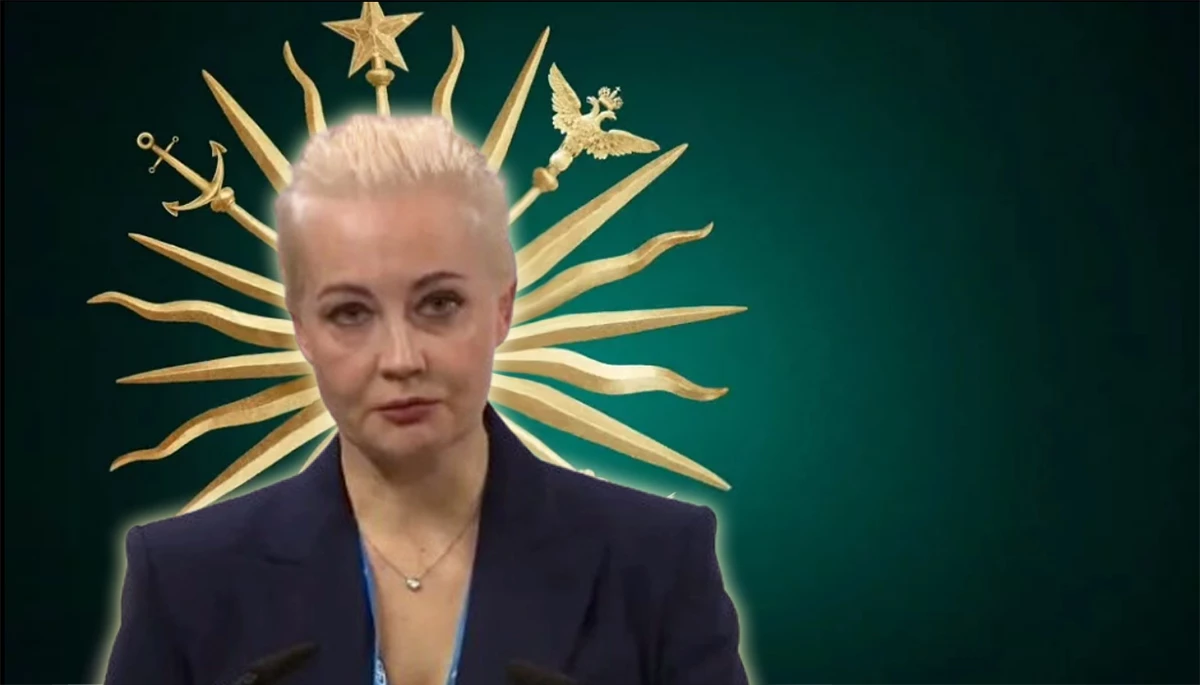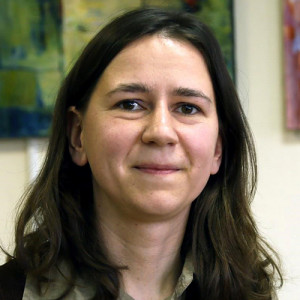Українською читайте тут.
Navalnaya, just like Putin, is offering Russians yet another sweet and beautiful fairy tale.
A few days after news broke about the death of Alexei Navalny in a Russian penal colony, his wife announced that she would “continue her husband’s cause.” She is now actively touring the world, presenting his book Patriot and promoting the typical talking points of the Russian liberal circle about “Putin’s war,” “innocent” Russian occupiers, and people “suffering on both sides.”
Recently, on X, she expressed outrage over the EU’s plans to ban tourist visas for her fellow citizens, insisting that “responsibility must be separated between the regime and ordinary Russians.” On that very same day, Russian drones attacked Poland. Yet, not a single tweet condemning the Kremlin’s actions appeared on the politician’s account.
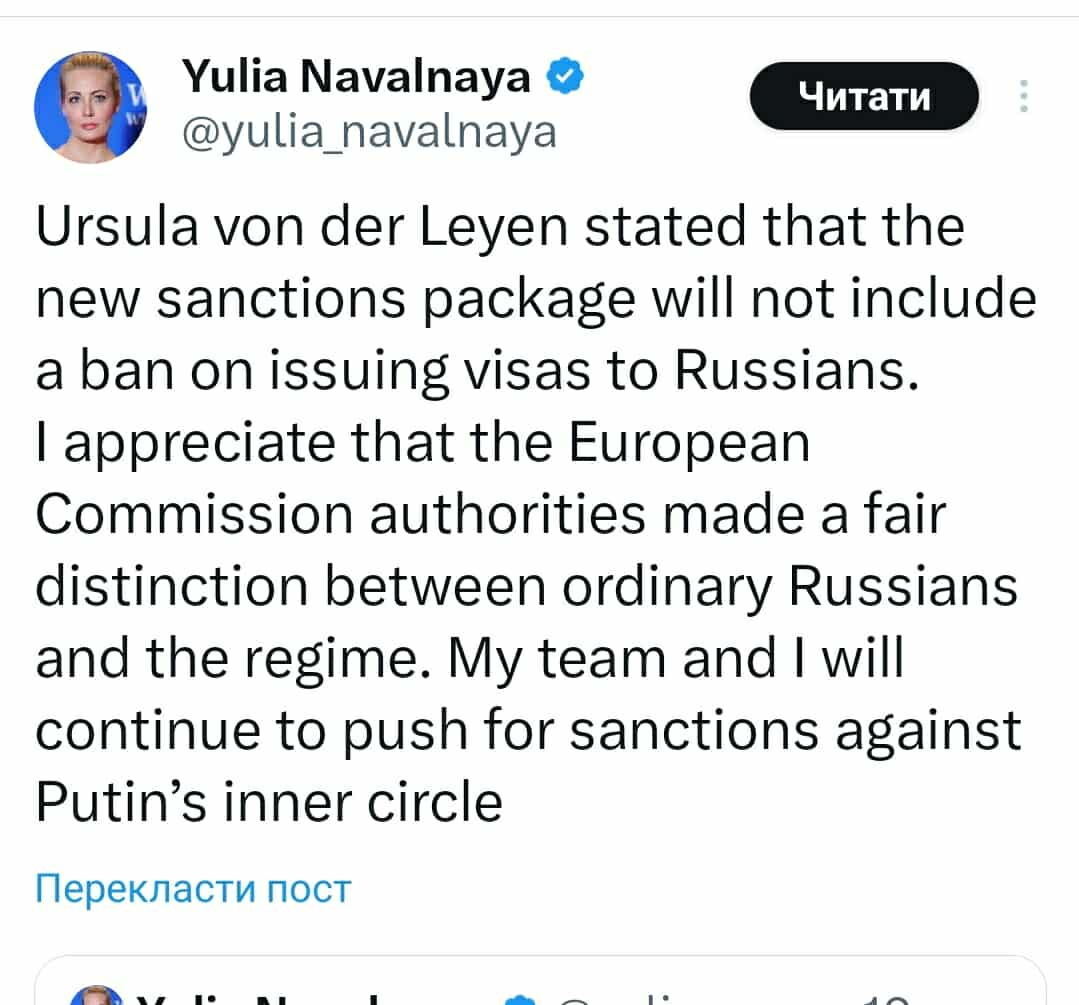
Just like her husband, she does not believe Crimea should be returned to Ukraine, does not support Western arms supplies to Ukraine, and rejects the idea that Russians should pay reparations to Ukrainians—arguing instead that only Putin and his closest circle are responsible for the war and should therefore pay.
The Russian opposition figure is also waging a battle in the media field. During a session at the European Parliament, she called for funding Russian exile media. She questioned why the EU allocated €5.5 million to support Radio Free Europe/Radio Liberty while Russian media received nothing. Navalnaya’s remarks were highlighted by Current Time host Iryna Romaliiska (from a joint RFE/RL and Voice of America project), who shared a fragment of her speech on Facebook.
Navalnaya asked: “How is it that the European Union chooses to support American media working on Russia, and not Russian media itself?” She argued that Russian outlets tell the “truth about the war,” while Ukrainian media experts consistently identify manipulations and even pro-Kremlin narratives in their content.
Such statements may resonate with Western audiences, who often treat her uncritically. Recently, while visiting Australia, local media dubbed her a “fearless voice” and the “de facto leader of the Russian opposition.” She appeared strong and determined in an interview with CBS News, declaring that she is not afraid to risk her life. A year after Navalny’s killing, CNN quoted her video address in which she vowed to fight for a “free, peaceful, and beautiful” Russia.
Ahead of the Trump-Putin meeting in Alaska, Navalnaya again attracted international media attention with a video calling for the release of Russian political activists, journalists, and Ukrainian civilians. Yet the beginning of that video raised eyebrows: she claimed that peace agreements were not the most important issue. Even if reached, she argued, it would remain unclear whether they would be honored, as both sides would “blame each other for violations.” Therefore, she continued, something “historic” should be done—namely, a prisoner exchange. In this framing, the war itself becomes just a backdrop. Who started it and who is fighting it does not matter, since—according to Navalnaya—anyone could break agreements; it is all just geopolitics. So, let’s simply focus on freeing people. Of course, releasing detainees is crucial. But in this case, as in many others, the politician manipulates the context by spreading responsibility for the war to both Putin and Zelensky.
Since many, including Western politicians, view Yulia Navalnaya as a significant figure of today’s Russian opposition—even placing hopes on her role in future democratization of what is now a fascist state—it is important to understand what truly lies behind her political ambitions: is it an effective political program, or merely another imitation of political activity? And what, exactly, is she telling her audience about Russia’s Great War against Ukraine?
Is Navalnaya Running for President?
More than half a year after her husband’s death, in an interview with the Russian service of the BBC, Yulia Navalnaya said that if she returned to Russia, she would run for president. A month later, in an interview with the Russian opposition media outlet Dozhd, she stated that she “never said anything about the presidency.” She claimed that the BBC journalist had asked whether she would run, and she gave an affirmative answer. Still, the Russian opposition figure acknowledged that she does have political ambitions: “if such an opportunity arises,” she “will seek leadership positions in Russia.”
In today’s Russia, the political opposition, together with the liberal media, has its own specific function: for a long time, it has served as a “controlled release valve” for society, helping the Kremlin simulate the presence of democracy while at the same time sharing the idea of the “Russian world.”
According to Ukrainian experts Vadym Denysenko and Vitalii Pyrovych, in their book Post-Putin: The Russia We Will Have to Live With for the Next 50 Years, Russian liberal media “together with the arrests played a crucial role in driving part of society back into the pen after the Bolotnaya protests.”
Now let’s recall a more recent protest action proposed by Navalnaya herself: “Noon Against Putin,” staged on the very day of his “elections.” In a video address, the so-called “leader” of Russia’s future urged supporters to come to the polling stations, stand there… and then go home. It is hard to imagine how the idea for such a “political action” could have come about, yet it turned out to be an entirely effective tool for stabilizing the situation, beneficial for the Kremlin. The opposition went out, let off some steam, once again imitated political activity, and then quietly returned to the “pen,” thus legitimizing yet another presidential term for Putin. And in her video address about the election results, Navalnaya even called them all “winners,” praising them for participating in the action.
This same play-acting as the opposition continues to this day. However, Russian liberals now mostly perform on the Western stage, which fails to grasp that this so-called opposition cannot serve as an alternative to Putin, because it deliberately avoids those difficult but fundamentally important questions that must be addressed to eradicate “rashism.”
Let us try to analyze this “game of opposition” by looking into Yulia Navalnaya’s social media presence:
- An X (Twitter) account created on February 19, 2024, just three days after the official date of her husband’s death (with over 300,000 followers);
- an Instagram account that the politician has been running since March 2014 (with over 1 million followers).
Her Telegram channel, created in November 2024, has just over 20,000 subscribers and was not taken into account precisely because of its relatively small audience.
I downloaded all the content from the mentioned social media platforms, including engagement statistics (likes, retweets, comments), covering the period from the date when the murder of Alexei Navalny in a Russian prison became known until September 1, 2025, and analyzed several aspects of Yulia Navalnaya’s communication:
- Popularity dynamics (since a politician must strive for maximum reach of their posts, look for timely news hooks, and find ways to engage the audience with their ideas);
- Topics of posts (if political activity is at stake, it should be at the forefront);
- Mentions of Ukraine (in the aforementioned interview with Dozhd, Navalnaya said that “in almost every speech… in every interview… she somehow addresses the issue of the war and Ukraine”);
- Mentions of the war.
The most popular posts are about her husband’s death, her son’s birthday, and her daughter’s graduation
Yulia Navalnaya created her Instagram account in March 2014, and she identifies herself exclusively through her husband. Her status reads: “Wife of the mentioned citizen, another politician, various activist, this gentleman.” This is a reference to the fact that Putin is afraid of Navalny and therefore avoids saying his name. However, the result is that the politician still lacks her own face, since this status has remained unchanged.
Now, let us look at the dynamics of her post popularity (taking into account those that gained more than 100,000 likes and comments combined) and analyze their topics. How many of them are truly political in nature and not connected to her husband’s murder?
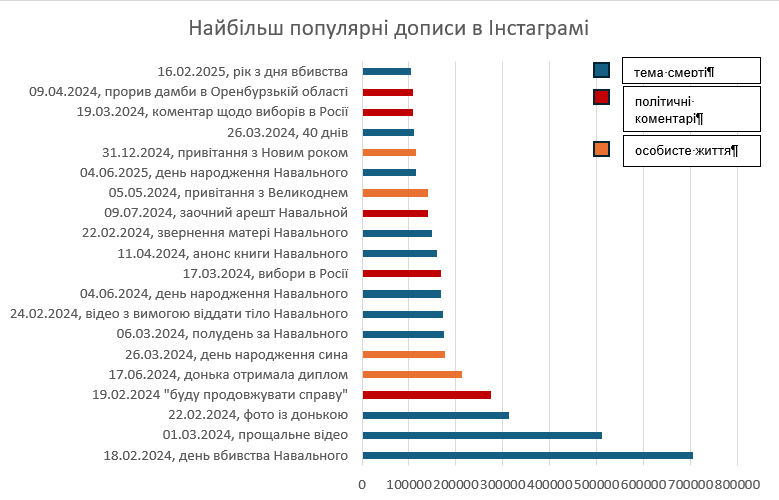
Thus, the most popular post was published a few days after the murder, gaining more than 700,000 likes and comments. We can also see that the majority of posts are in one way or another connected to her husband’s death and were either created during the first month afterward or serve as reminders: 40 days, his birthday, one year since his death, and so on. Another recurring theme is Navalny’s autobiographical book, which the politician occasionally promotes on her social media.
Four other posts relate to her personal life. Among the top five most popular is a post congratulating her daughter on receiving her diploma. Followers also engaged strongly with posts about her son’s birthday, as well as New Year’s and Easter greetings—none of which contained political statements.
So, only five posts remain that can be classified as political: one of them, published the day after her husband’s murder—“I will continue Alexei’s work”—gained more than 275,000 likes and comments. The less popular ones relate to the Russian elections and the dam break in the Orenburg region, discussed below.
Besides these posts, Navalnaya’s Instagram contains other political content, but these rarely go viral, even though she frequently urges followers to share them.
The situation on X (Twitter) is very similar. Most popular posts were created in February–March 2024, immediately after Navalny’s murder. Among the political posts are calls to join the “Noon Against Putin” campaign, photos from the event, a repost of a photo of Russian political prisoners after their release, and congratulations to Ukrainian director Mstyslav Chernov on receiving an Oscar. Personal posts are the same as on Instagram.
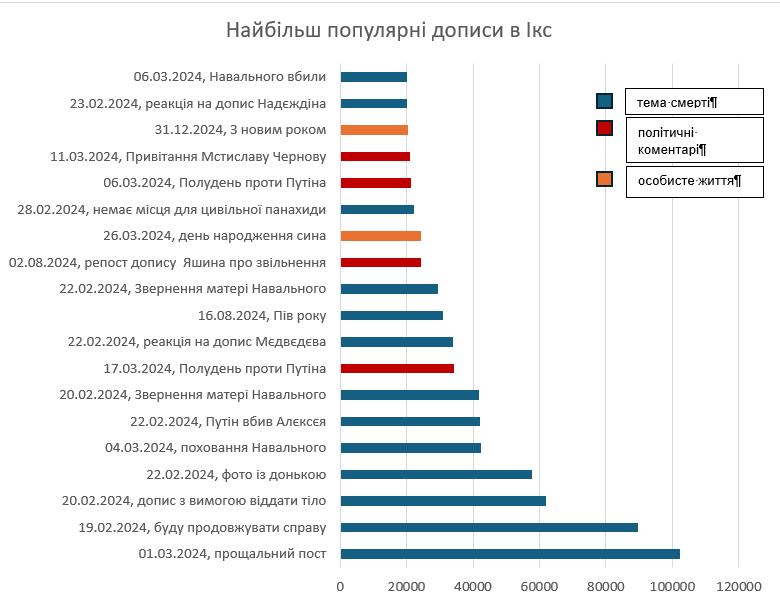
The conclusion that emerges from the analysis of the politician’s social media is very straightforward: apart from the topic of Navalny’s death, neither she nor her team has been able to offer anything of comparable significance.
The popularity of her posts declines over time
Let’s take a closer look at the dynamics of post popularity. The trends are very telling, with results that, in my view, are rather discouraging for Yulia Navalnaya’s team.
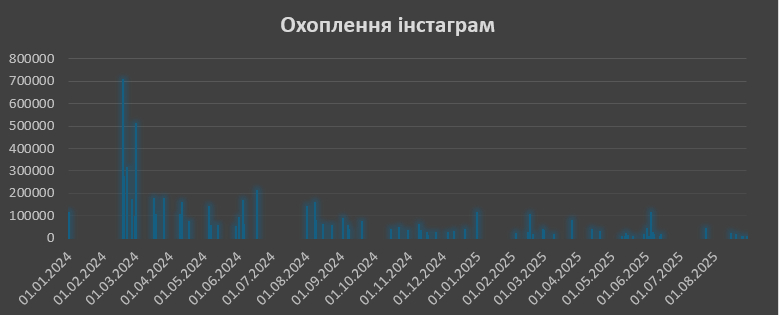
Interest in the politician’s posts remained relatively high (with about one in five followers seeing them) until June 2024. On June 17, for example, a post about her daughter’s graduation received a large number of views.
After that, there were minor spikes of attention to the topic of political prisoners (on August 1 and 8). By the end of 2024, attention to posts had dropped to around 20,000–60,000 views. The most popular post during this period was the New Year’s greeting, which gained over 114,000 engagements.
Popular posts in 2025 included the anniversary of Navalny’s death, her son’s birthday, and Navalny’s birthday.
Now let’s look at the situation on X (Twitter), where the pattern is similar.
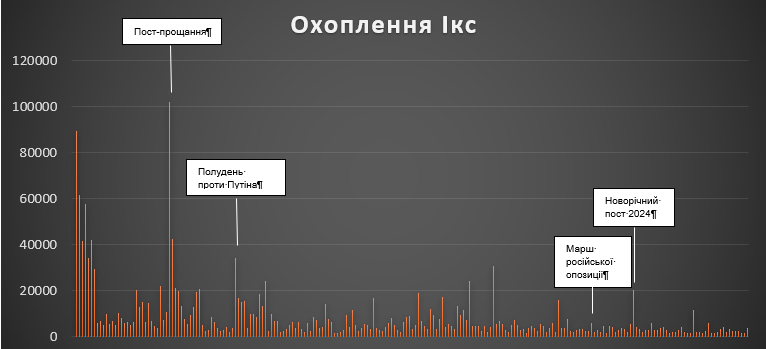
There were a large number of posts in 2024, and they were initially very popular. For example, in the first days after the murder became known: February 19–22, the farewell post on March 1, the “Noon Against Putin” campaign, the 40-day memorial after her husband’s death, and all the other posts mentioned earlier. By contrast, in 2025, the average post receives just over 3,000 likes, comments, and reposts.
Why is the dynamics like this?
Immediately after Navalny’s death in the colony became known, Navalnaya and her team actively used social media to spread information about it. Importantly, they also engaged key opinion leaders. Building alliances with potential partners is a crucial task for a politician who may lack their own resources (including audience) for influence.
“Noon Against Putin” was the only truly impactful political campaign conducted on Navalnaya’s social media. It received over 21,000 reactions and reached more than 1.1 million users—three times her follower count. Why? Because the event took place a month after Navalny’s death and, evidently, gained a significant number of reactions and reach through momentum.
By contrast, the post about the Russian opposition march in Berlin, which Navalnaya promoted six months later in November, had more modest results. Efforts were also made to involve key opinion leaders, such as the exchanged Vladimir Kara-Murza and Ilya Yashin. However, out of her one-million-strong Instagram audience, only around 14,000 followers reacted to the call to join the march (through likes and comments). A similar post on X garnered nearly 6,000 reactions and reached 244,000 users.
Overall, we can conclude that after March 2024, Navalnaya was unable to create viral content on either Instagram or X, as her reach was significantly lower than her follower numbers. This also affected the popularity of certain political initiatives launched via her social media pages. Clearly, aside from commemorating the late opposition figure, audiences still need to be offered other important topics.
War and Putin—Because of Corruption
Now let’s take a closer look at Navalnaya’s posts, focusing on X, where political topics appear more often than on Instagram, and posts are frequently duplicated.
Navalny and his team’s main criticism of Putin is not about the wars Russia waged or continues to wage, nor about political persecution and restrictions on rights and freedoms, but about theft. According to Navalny himself, if the authorities did not steal, everything would be fine. He famously called the leading Russian party United Russia the “party of crooks and thieves.” The high-profile film Traitors, released by Navalny’s associate Maria Pevchikh after his death, also revolves around this idea: if the elites of the time hadn’t stolen, Russia wouldn’t be in the state it is today. The answer to the question of how to improve Russia after Putin is boiled down to keeping former corrupt officials out of power.
In other words, Navalny and his team focus on corruption in Russia, while wars are secondary or tertiary. For example, the FBK investigation Who Steals in Rocket Building, released in May 2023, highlighted embezzlement in the defense industry. Civilian deaths in Ukraine were only mentioned briefly, but a paradox emerges: Putin and the propaganda claim they “revived the defense industry,” yet it’s also being stolen from, which is bad. The implied argument is that if they hadn’t stolen, the situation would somehow improve—even in terms of waging war.
Thus, the core message of Navalnaya’s modern political posts is that the government must not steal, people should have decent salaries and pensions, and citizens should live comfortably.
For example, in a post about the dam break in the Orenburg region, she writes, "The state must serve the people. Mayors, governors, and the president should think about how to make life comfortable in the country. That is their only task. And this government cannot fulfill it."
Notably, during a war waged by her own country, the emphasis is on citizens’ “comfort,” with no mention of the war itself. Why? Because for Navalny’s team, the war and Putin’s regime are about money. If money is redistributed correctly, everyone will live comfortably and peacefully.
Another post reads, "This government has enormous houses and yachts, billions in stolen money, an army, and propaganda, but it lacks the most important thing—love for Russia and a desire to make our country better."
In other words, if they loved Russia and didn’t steal, there would be no problems.
Navalnaya believes changes in Russia can happen quickly: "Russia will become completely different and will surprise everyone with how fast these changes occur."
Or, in a post about meeting Polish politicians: "Both Lech Wałęsa and Adam Michnik fully believe in rapid positive change in Russia."
Shortly after her husband’s death, Navalnaya wrote a column for the Washington Post titled “Putin isn’t a politician, he’s a gangster.” She explained that her husband always knew the Kremlin dictator and his associates were thieves.
"To criminal leaders, money is crucial. Putin is indifferent to the suffering of ordinary people both in Ukraine and in Russia," she noted. Her prescription: deprive Putin and his circle of money, and support for the war will decline. She also emphasized funding not only Ukraine and its army but also the Russians who “continue to resist inside Russia.”
In a post about Assad’s regime in Syria, she wrote: "For years, Putin funneled money to Assad from our pockets. Russian soldiers died so that the Assads could live in luxury."
In short, Navalnaya’s political messaging frames war, oppression, and foreign aggression primarily as consequences of corruption, rather than as moral or geopolitical issues. The solution, in her framing, is financial: stop stealing, redistribute resources, and comfort and stability will follow.
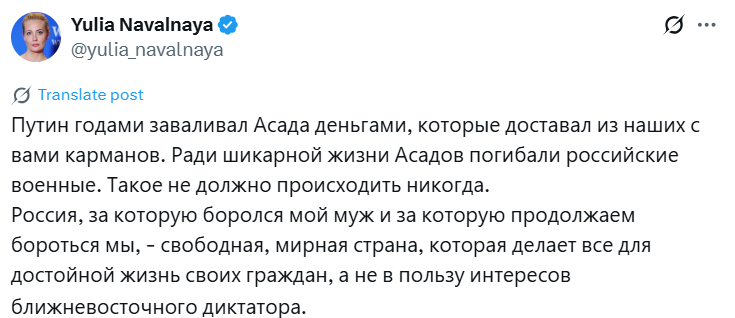
So it’s all Putin’s fault—he stole the money from Russians. And because of that, innocent Russian “boys” died, even though many of them committed numerous war crimes, including in Syria.
Evidently, Navalnaya understands the causes of the full-scale Russian invasion in the same way: Putin wages war to steal money. Rockets are built not so much to fight as to siphon off cash. Russian soldiers are also victims of this scheme.
In this way, Russian “oppositionists” ignore the real causes of the full-scale war: the aim to destroy Ukrainians as a nation and to permanently eliminate the Ukrainian state. Or, as Eva Thompson put it, Russians—while seeing social injustice as always—turn blind when it comes to their state’s attempt to erase other nations.
Putin Is to Blame for Everything, and Russia Has a “Civil Society”
The politician blames the Russian dictator for everything: her husband’s murder, the current state of affairs in Russia, and, of course, the war. The impression created is of an all-powerful individual with unlimited capabilities:
- Putin is a cowardly weakling – he blocked the website about the monument on Navalny’s grave
- Putin launched an attack on brave women [journalist Antonina Favorska and activist Olga Komleva]
- Putin released a “maniac” and a “dismemberer” from prison, who participated in the “special military operation”
- Putin blocked YouTube
- Putin “holds political prisoners hostage”
- Putin interfered with Moldovan President Maia Sandu’s election victory
- Putin is “driving the country into a dead end.”
She also writes about Putin’s “inner circle,” the “mafia,” “investigators,” and “censors” who help him and, effectively, act in concert with him. Naturally, this excludes the thousands of ordinary Russians who carry out his will: reporting on political prisoners, running “lessons on the main thing,” shoulder to shoulder with former killers hailed as “SMO heroes.” They vote for Putin in elections, and so together they “drive the country into a dead end.” Not to mention specific pro-Russian politicians in Moldova who obstructed Maia Sandu…
And, of course, the war in Ukraine is attributed solely to Putin and his “circle,” not Russian society. Navalnaya emphasizes that Putin and the Russians must be distinguished, because, in her view, the “real Russia” is “against the war.”
For example, in a post reacting to events in the Kursk region, she writes, "The war has finally come to Russia. Putin and his circle are to blame. Are they trying to help the local residents? Evacuate them, and provide fair compensation? No, they don’t care about people. Human lives on both sides are worthless to them."
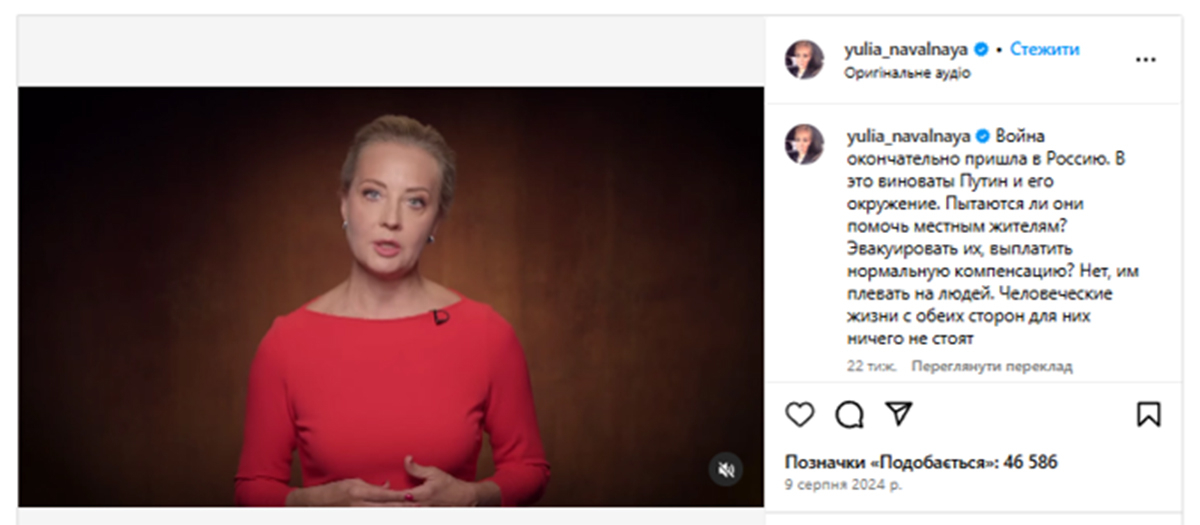
In this post, Russians are portrayed as victims of Putin and are even equated with Ukrainians, just as in her article about “Putin the gangster.”
Navalnaya repeats the idea that Putin and Russians are distinct, also for Western politicians:
- "I am glad that the British government understands: Putin is not Russia. The real Russia opposes the war and supports a change of power."
- "There are many Russians who are against Putin and against the war."
- "Even more importantly and correctly, Members of the European Parliament, representing 450 million Europeans, overwhelmingly expressed solidarity with Russian civil society and all those opposing Putin and his war."
Thus, according to her framing, there is a civil society in Russia.
“Against the War” and “Ukrainians Shouldn’t Invent an Enemy in the Image of the Russian Opposition”
Navalnaya does mention the war, but it comes across as very abstract in her posts.
For example, in a post on the third anniversary of the war, she writes:
"Three years of a terrible war, tens of thousands killed, millions of lives shattered. On February 24, 2022, it seemed that the unthinkable had happened—this simply cannot be—but today we are at a point where this unthinkable has continued for three years. We must never forget this crime. Remember not only the anniversary, but every day. Today, February 24, actions against the war are taking place around the world. Join them. Come out on March 1 for the march. There should be many of us."
Yes, the war is terrible—but who is waging it? According to her framing, the war began on February 24 and has “continued for three years,” not more than a decade. It’s a crime, but who are the criminals?
Moreover, since Navalnaya, like her husband, speaks ambiguously about Russian aggression, it’s unclear what she means by being “against the war” and how she envisions it ending.
Similarly, in many other posts, it is not always clear against whom the war is being fought. She only mentions the “war in Ukraine,” without ever naming Russia as the aggressor. Russia, in her framing, is not at fault; the blame lies solely with Putin.
For example, in a post about the missile strike on Okhmatdyt, she calls it a “horrible crime beyond imagination” and blames it on “Putin and his regime.” There is no mention of the Russians who carried out the strike.
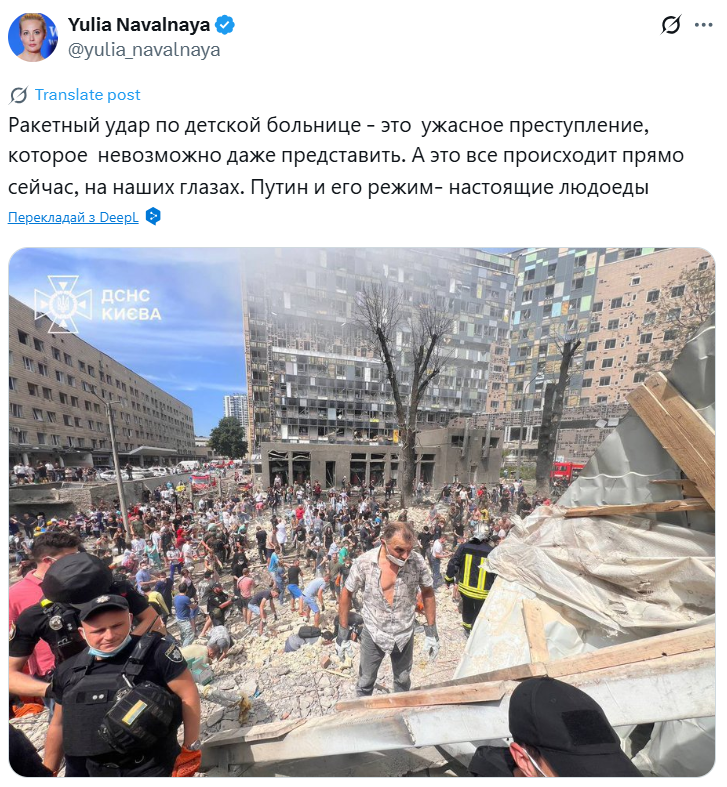
Regarding Ukraine, the country is mostly mentioned only in the phrase “the war in Ukraine.” A few other references include “the whole world rushed to help Ukraine” (after February 24) and a post about Ukrainians who tried to disrupt her speech at the Web Summit. Addressing them, Navalnaya writes:
"We have only one enemy. Ukrainians don’t need to invent an enemy in the image of the Russian opposition."
But in reality, the enemies are different. For Navalnaya, it’s Putin; for Ukraine, it’s Russia—a fact that the oppositionist carefully whitewashes.
So, what is Navalnaya’s political program?
In her posts, it’s very simple: there is Putin and his circle, who want to steal. And that’s why they wage war. Money must be taken from them and given to the Russian opposition and media, because they are honest and “love Russia.” And they have proven this love by suffering persecution from the “gangsters.” Navalny’s team will release a few more corruption investigations, politically minded Russians will share these investigations with Putin’s supporters, and they will stop supporting him.
There are the simple, good Russian people and the evil Putin. Remove Putin, put Navalnaya—or another liberal—in charge, and Russia will quickly undergo democratic change.
In the war, Putin and his circle are to blame. Ordinary Russians, like Russian soldiers, are not guilty. They are hostages. They also suffer. They should be pitied, and money should be spent on social advertising against the war, because that is more effective than giving weapons to Ukrainians. Navalny himself wrote this.
When you read all of this, you can’t help but wonder: do they actually believe this nonsense? Maybe it’s a form of psychological displacement—justifying your monstrous, murderous country? Not seeing the “Russian boys” launching rockets and Shahed drones at civilians in Ukraine or poisoning civilians in Syria?
Or perhaps this is actually some subtle political technology? I lean toward the latter.
Navalnaya, like Putin, offers Russians another sweet and beautiful fairy tale. “You give me hope,” she tells Russians in her posts. “You are extraordinary.” And the murderer? Only Putin—relax. And this sells. Not very effectively, as social media analysis shows, but for her team, it’s better than nothing.
But how does she plan to govern a country where no one has been told that killing simply because the state pays you is wrong? That taking someone else’s property because you are stronger is not normal? “You die today, I die tomorrow”—this is how people live in such a state, as Solzhenitsyn wrote. And if Navalnaya really plans to return home after Putin, as she promises in many interviews, she will live in exactly this Russia.
We often talk about how Navalnaya is harmful to Ukraine. Her speeches—and those of her daughter—are often met with protests by Ukrainians abroad, who try to explain to Europeans why they should not listen to her.
But if we look at the situation objectively, Navalnaya harms Russians the most. Not only does Putin take away their future, but she does too.

